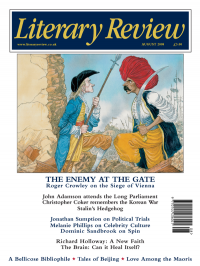John Dugdale
Everything Is Replicated
The Lazarus Project
By Aleksandar Hemon
Picador 294pp £14.99
Jonathan Safran Foer’s Everything is Illuminated (2002), in which the narrator searches for a survivor of a Nazi atrocity, was the first of a series of recent American novels that can be called ‘Passages to Russia’ – partly or wholly set in countries that formerly belonged to the USSR. Their authors can look to Vladimir Nabokov’s fiction as a model for bringing America and Russia together, but these works – boisterous satires or picaresque yarns, with earthy black comedy the norm – could hardly be more different from his elaborate artificial constructions.
Lillian, the heroine of Amy Bloom’s Away, comes to 1920s New York after seeing her family murdered in a pogrom but, on learning her that daughter also survived, travels westwards to the Pacific with the aim of rejoining her in Russia. Gary Shteyngart’s Absurdistan centres on Misha, the American-educated son of a Russian gangster who is made a minister in a former Soviet republic.
The Lazarus Project has received advance praise from Shteyngart, but it’s Everything is Illuminated that it often recalls, since it similarly features a character who is a version of the author and interweaves two contrasting narratives. One is set in Chicago in 1908, and begins with the historical event of the killing of Lazarus Averbuch, a Jewish immigrant from Ukraine, at the home of the city’s chief of police. What Averbuch was doing there is never entirely clear, but he was suspected of intending to assassinate Chief Sheppy and was shot by him after handing him a letter.
Lazarus’s sister Olga then becomes the focal figure in these Conrad-influenced historical chapters, as Lazarus is smeared as part of an anarchist plot by the police and newspapers, and hastily given a pauper’s burial. All those close to him are treated viciously by the cops in the search for other followers of the ‘Red Queen’, the anarchist firebrand Emma Goldman. But Olga succeeds in hiding her brother’s friend Isador, and Lazarus’s body is recovered for a proper funeral.
The other, contemporary strand is narrated by Vladimir Brik, a Bosnian-American writer. He secures a grant to research the Lazarus Averbuch story, and takes with him the photographer Rora, who like him was born in Bosnia but unlike him was there during the war. They travel first to Ukraine, where Lazarus fled a pogrom, and then via Moldova and Romania to Sarajevo, having adventures – winning big at a casino, staying in a brothel, beating up their driver for sex-trafficking and rescuing his intended victim – en route.
The two narratives sometimes echo each other (both, for example, include journalists called Miller) and by the end have begun to converge, with scenes from 1908 suddenly introduced into Vladimir’s European journey. They also share themes of exile, genocidal violence (the pogrom for the Averbuchs, the Chetniks’ bombardment of Sarajevo), and unreliable storytelling.
Both strands are questionable tales told by Vladimir, and full of other fabulists who may be liars or incontinent exaggerators – and may be real figures, real figures reworked, or complete inventions. The novel opens as follows: ‘The time and place are the only things I am certain of: March 2, 1908. Beyond that is the haze of history and pain, and now I plunge: …’ After that the historical narrative has no other trace of Vladimir’s fingerprints, and is presented as fact, as if reconstructing actions and thoughts is unproblematic. No afterword on sources indicates where history stops and imagination begins; we are not told, for example, whether the parallels with the biblical Lazarus story are genuine or novelistic contrivance.
In the contemporary chapters, the unreliability issue becomes (as in Everything is Illuminated, with its questing character called Jonathan) the teasing question of how much of the story is autobiographical. The author too is a Bosnian-American writer, living in Chicago and married to an American; furthermore he received a grant to research the 1908 incident, and travelled to Eastern Europe with his friend Velibor Bozovic, a photographer who was in Sarajevo in the siege (photos Bozovic took during the trip are reproduced between chapters).
All this may sound promising, but the result is a perplexing novel in which neither strand works as stand-alone fiction. The historical chapters don’t find a way of engaging the reader in the process of imagining the past; and while there are present-day parallels in the police witch-hunt, they tell us nothing new about anti-terrorist paranoia. The other narrative, meanwhile, is a self-indulgent road novella whose aim is unclear, neither funny enough to be comedy nor insightful enough to be a portrait of contemporary Eastern Europe.
As when someone acclaims an artist only for his brushstrokes, Shteyngart’s praise for Hemon (he ‘can’t write a boring sentence’) is also unwittingly damning. Aleksandar Hemon is essentially a miniaturist with a flair for stylistically striking description, at his best here in passages evoking Olga’s apartment and neighbourhood. On this evidence he should stick to the sketches and short stories at which he excels, rather than acceding to the familiar pressures to produce long-form fiction.

Sign Up to our newsletter
Receive free articles, highlights from the archive, news, details of prizes, and much more.@Lit_Review
Follow Literary Review on Twitter
Twitter Feed
How to ruin a film - a short guide by @TWHodgkinson:
Thomas W Hodgkinson - There Was No Sorcerer
Thomas W Hodgkinson: There Was No Sorcerer - Box Office Poison: Hollywood’s Story in a Century of Flops by Tim Robey
literaryreview.co.uk
How to ruin a film - a short guide by @TWHodgkinson:
Thomas W Hodgkinson - There Was No Sorcerer
Thomas W Hodgkinson: There Was No Sorcerer - Box Office Poison: Hollywood’s Story in a Century of Flops by Tim Robey
literaryreview.co.uk
Give the gift that lasts all year with a subscription to Literary Review. Save up to 35% on the cover price when you visit us at https://literaryreview.co.uk/subscribe and enter the code 'XMAS24'